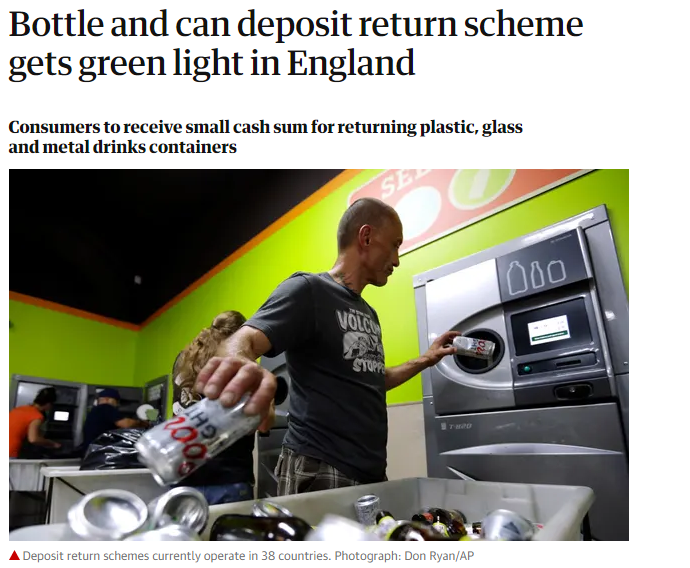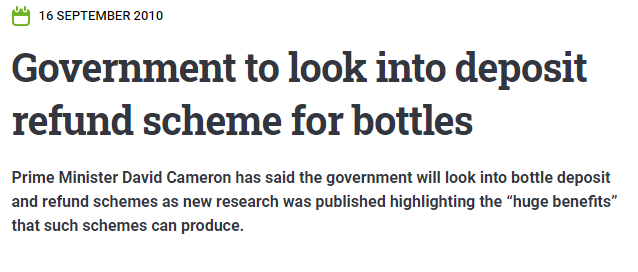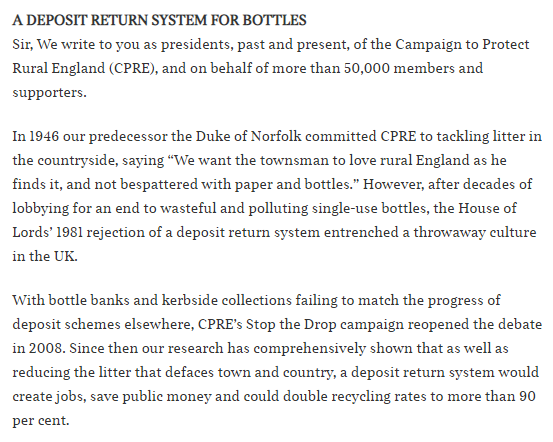Getting a ‘yes’ to DRS
How we got the government to back a deposit return scheme
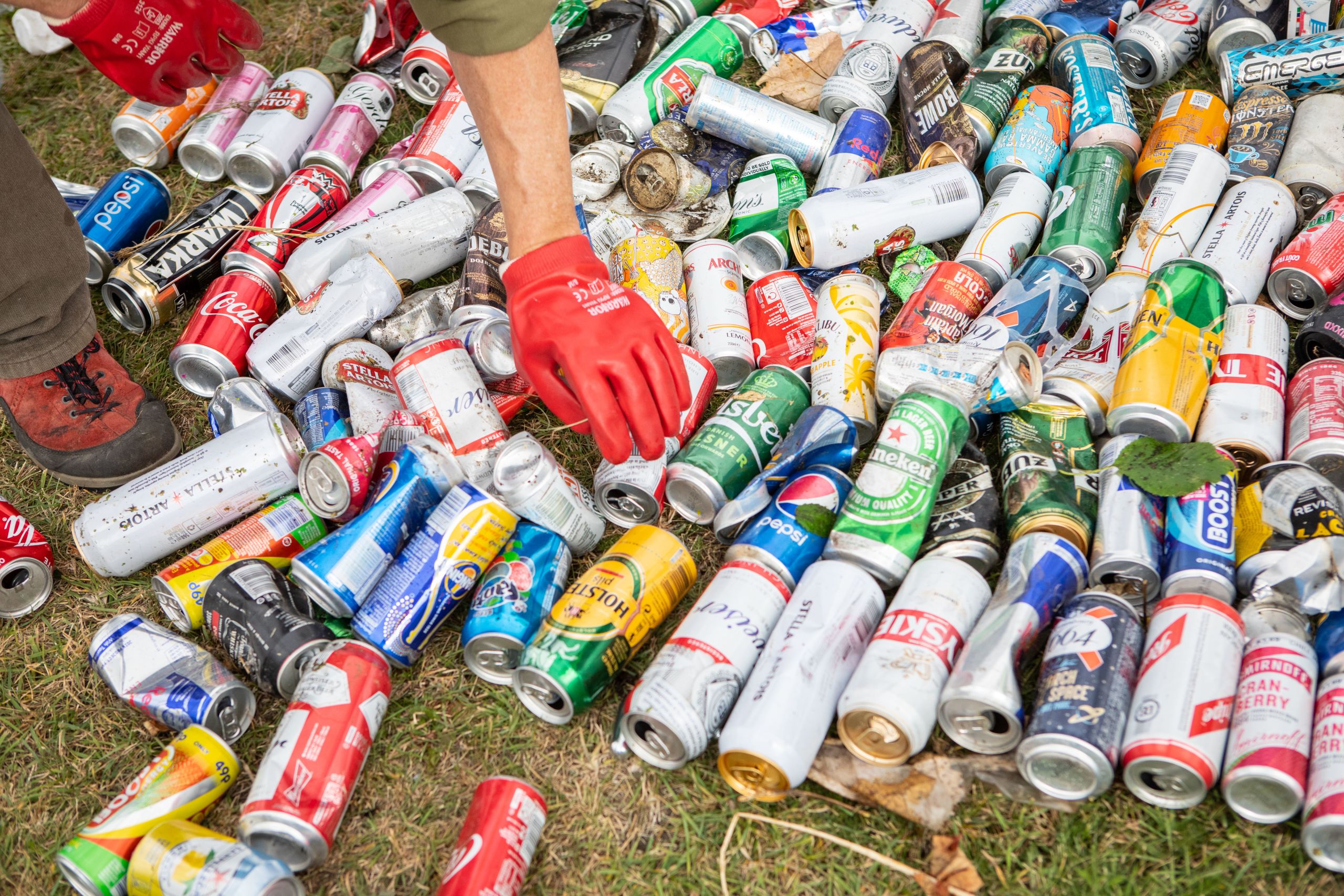
In March 2018 the government announced that there would be a deposit return scheme (DRS) set up in the UK – a simple way of incentivising the recycling of drinks containers in order to stop them from ending up as litter.
For CPRE, the countryside charity, and its supporters this was a huge cause for celebration, after a campaign lasting through several governments.
With partners globally as well as nationally, we'd run litter picks to show how bad the drinks container problem was, done the sums to show how it makes sense economically and helped the media find examples of how it worked in countries like our own.
This is the story of how it all came together.
Our littered past
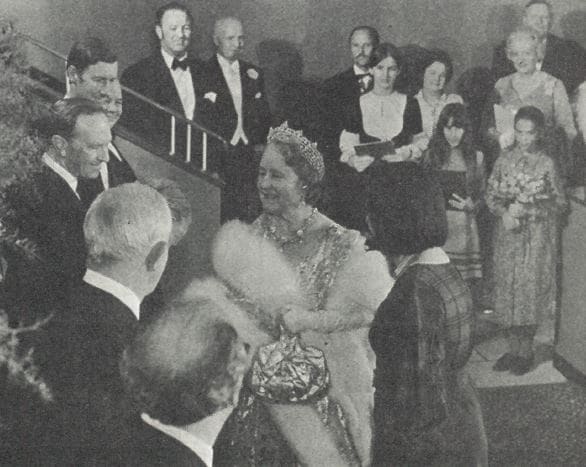
Since CPRE started its work in 1926, we've worked with fellow litter campaigners to find ways to stop litter blighting our countryside.
We've used various ways to highlight the issue. As early as 1929, when our Sheffield and Peak District local group organised a schools litter pick at Stanage Pole outside Sheffield, the litter was placed in a glass case and exhibited at Cutlers’ Hall, Sheffield, pointedly - and honestly - titled ‘What Sheffield Left at Stanage Last Bank Holiday’.

The Queen Mother in 1958, congratulating CPRE volunteers on their Keep Britain Tidy campaign
The Queen Mother in 1958, congratulating CPRE volunteers on their Keep Britain Tidy campaign
From the 1920s to the 1980s, there was a DRS for glass bottles in this country. A couple of pence deposit was paid as part of the sale price and became the reward for those taking their bottles back to the shop for reuse.
A new DRS will work on the same principle: a small deposit – something like 20p – will be added to the price of drinks in containers. When you return the container to a designated machine or shop for recycling you will have that money returned to you. It’s a simple idea that’s overdue a big comeback.

Stop the Drop
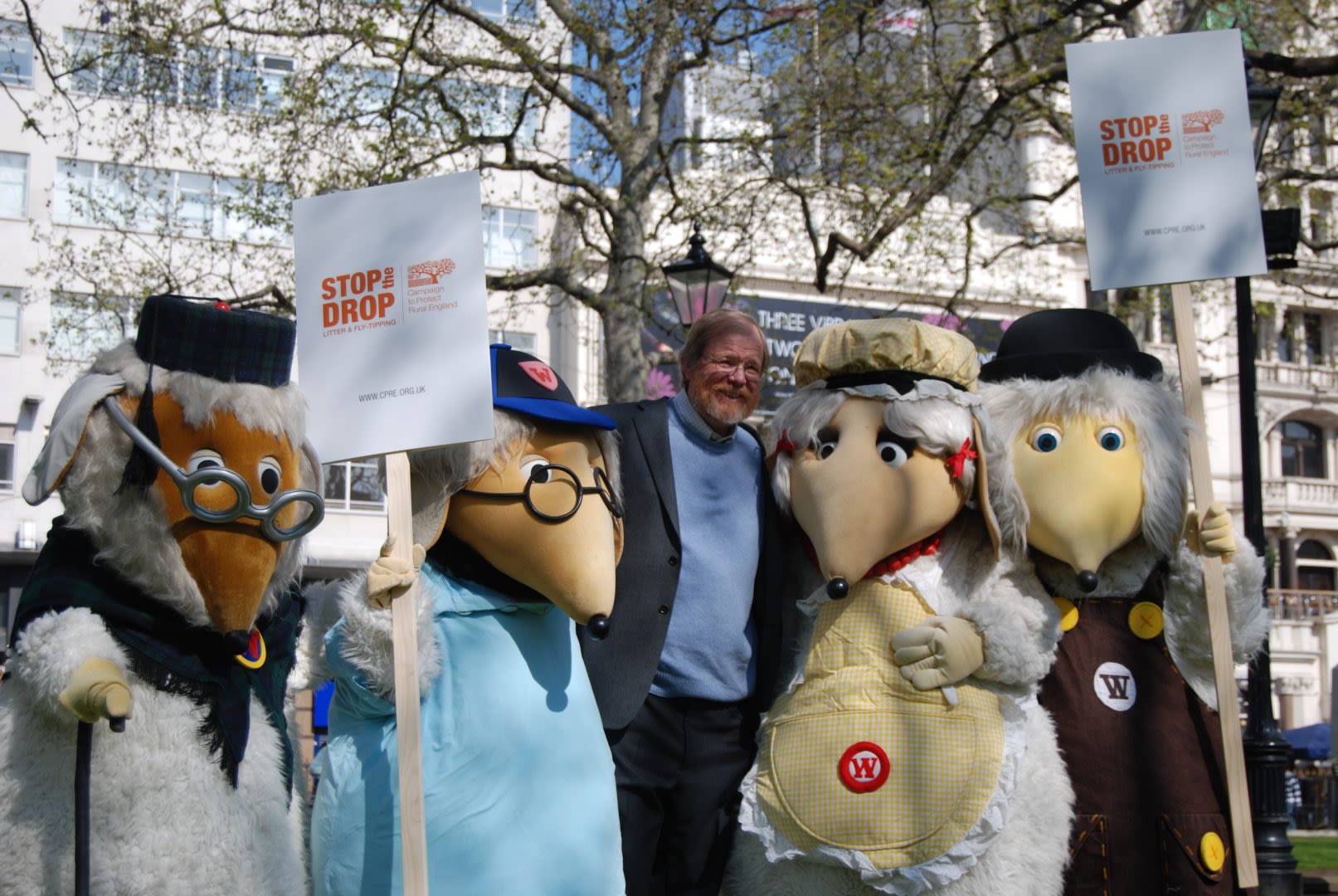
We first got noisy about a DRS in 2008 when our then-president, author Bill Bryson, was keen to focus on litter during his time with CPRE. In March, he joins top litter-pickers the Wombles to launch CPRE’s Stop the Drop campaign against litter and fly-tipping, including a call for ‘action to introduce a nationwide deposit system for drinks containers that ‘would reward the public for returning used drinks containers, boost recycling and reduce litter.'

We work with Wiltshire Wildlife Trust to publish a litter education pack for schools and our December 2008 poll shows massive overwhelming public support for a return of bottle deposit schemes. A whopping 82% of those polled by Ipsos MORI say they'd support a scheme where at least 5p is included in the price of every drink container, with that deposit paid back when the container is returned for recycling. Four in five of those polled say they'd support a 10p scheme.
DRS is clearly a popular idea.
Underground, overground… overseas
We also start looking overseas - and it's clear that many other countries are way ahead of us. In 2008, several US states already have deposit schemes, as do South Australia and European countries such as Germany, Denmark and Sweden. In all of these countries, a DRS has significantly increased recycling rates.
Our 2009 report commissioned from the Policy Exchange think tank, Litterbugs: how to deal with the problem of littering, calls for the introduction of a national deposit scheme that's linked into broader waste and recycling policy. It highlights that a New York State scheme that had ‘reduced littering significantly and has helped to promote a virtuous cycle of behaviour’.
In his foreword to the report, Bill Bryson says: ‘Surely a no-brainer, then, to introduce a similar system in the UK.’
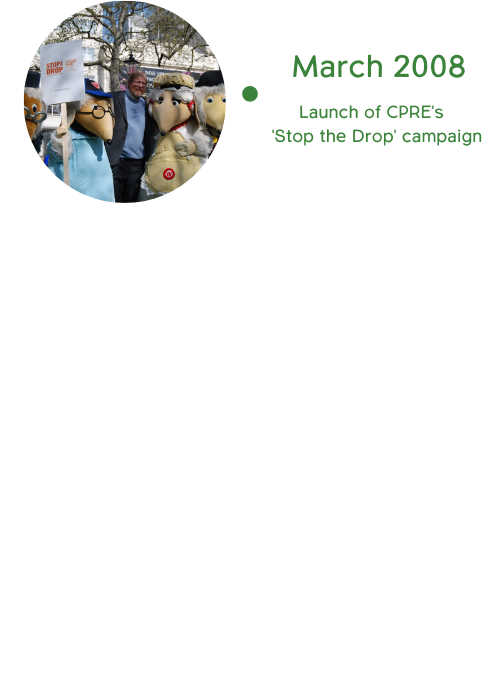
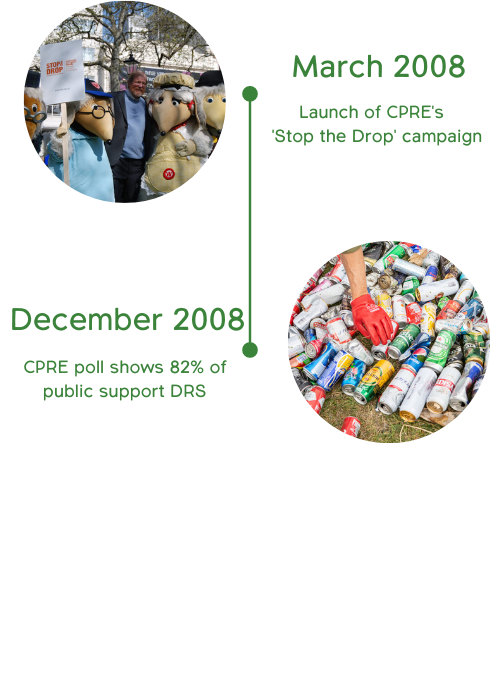
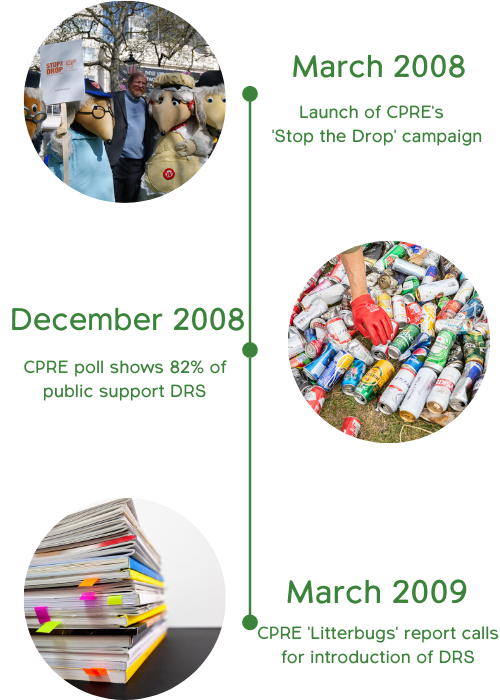
We first got noisy about a DRS in 2008 when our then-president, author Bill Bryson, was keen to focus on litter during his time with CPRE. In March, he joins top litter-pickers the Wombles to launch CPRE’s Stop the Drop campaign against litter and fly-tipping, including a call for ‘action to introduce a nationwide deposit system for drinks containers that ‘would reward the public for returning used drinks containers, boost recycling and reduce litter.'

We work with Wiltshire Wildlife Trust to publish a litter education pack for schools and our December 2008 poll shows massive overwhelming public support for a return of bottle deposit schemes. A whopping 82% of those polled by Ipsos MORI say they'd support a scheme where at least 5p is included in the price of every drink container, with that deposit paid back when the container is returned for recycling. Four in five of those polled say they'd support a 10p scheme.
DRS is clearly a popular idea.
Underground, overground… overseas
We also started looking overseas - and it was clear that many other countries were ahead of us. In 2008, several US states already had deposit schemes, as did South Australia and European countries such as Germany, Denmark and Sweden. In all of these countries, a DRS significantly increased recycling rates.
Our 2009 report commissioned from the Policy Exchange think tank, Litterbugs: how to deal with the problem of littering, calls for the introduction of a national deposit scheme that's linked into broader waste and recycling policy. It highlights that a New York State scheme that had ‘reduced littering significantly and has helped to promote a virtuous cycle of behaviour’.
In his foreword, Bill Bryson says: ‘Surely a no-brainer, then, to introduce a similar system in the UK.’
Talking to big drink
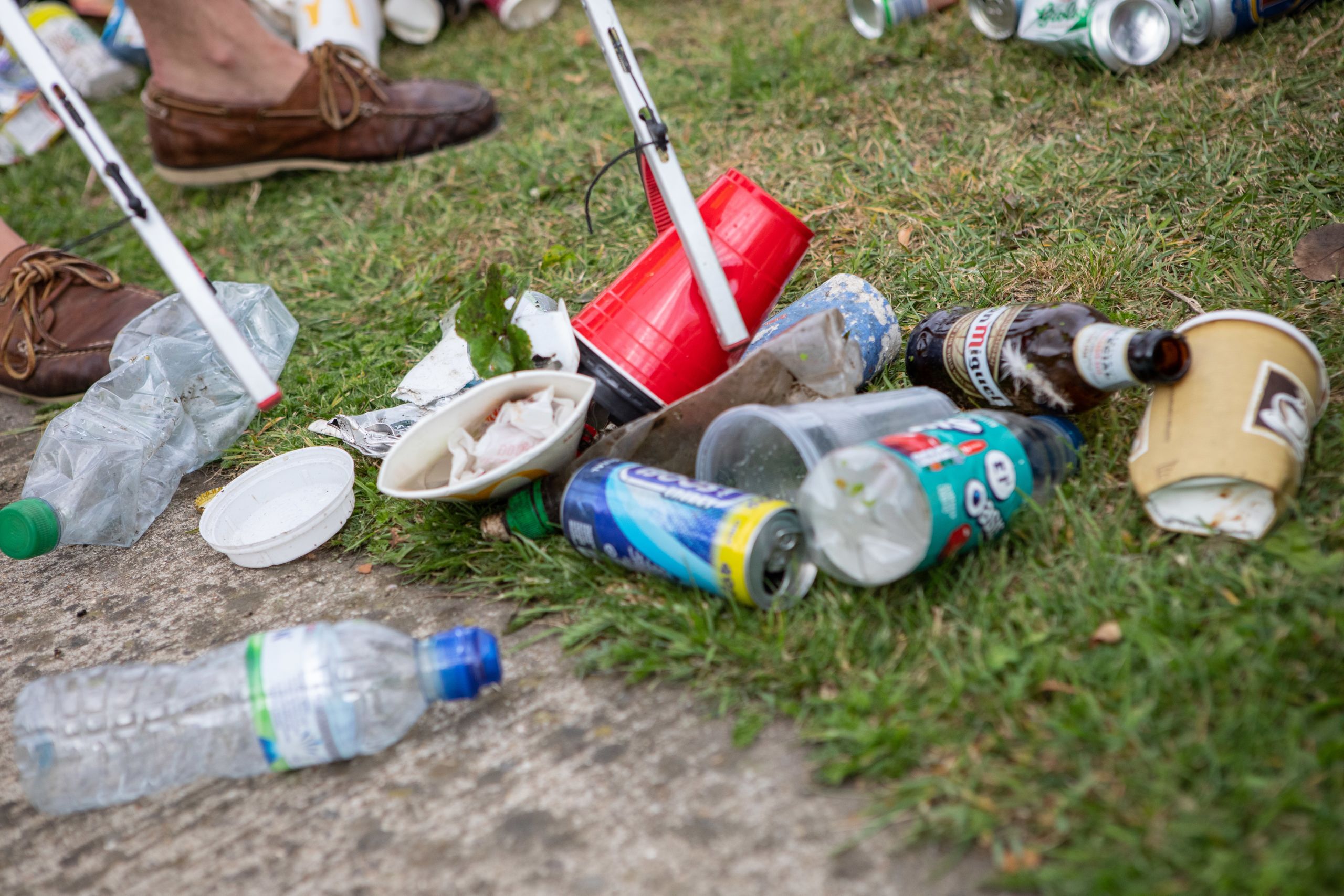



2010 sees us starting to reach out to the drinks industry. Bill Bryson and CPRE Northamptonshire join Carlsberg UK in clearing drinks cans from the banks of the River Nene in Northampton. At the same time, we gather some more advanced financial analyses. Have we got the bottle?, commissioned from waste consultants Eunomia, is the first comprehensive cost-benefit analysis into how a DRS could work in the UK.
It clearly demonstrates that such a scheme would cost little to set up, and would generate revenue to support most of its own running costs. The research shows how the scheme would help the government achieve a ‘zero waste’ economy by increasing recycling rates and reducing litter - while reducing costs to the public sector by £160 million per year (or £7 per household).
And with a new coalition government in place, David Cameron - prime minister at the time - pledges to look into our proposals after being asked about CPRE’s research at Prime Minister’s Questions.
Bill Bryson says: ‘These findings throw rational and informed light on an issue that is nonsensically contentious in the UK. What sensible nation would not want to capture and recycle its precious and finite resources? What discerning people would not want to enjoy a litter-free environment? CPRE has published this research to reignite the debate so that an effective mechanism which delivers environmental and social benefits in many other countries can be given its proper consideration in the UK.’
The report suggests that a deposit of 15p for bottles and cans smaller than 500ml (and 30p for larger containers) would generate return rates of around 90%.
2010 sees us starting to reach out to the drinks industry. Bill Bryson and CPRE Northamptonshire join Carlsberg UK in clearing drinks cans from the banks of the River Nene in Northampton. At the same time, we gather some more advanced financial analyses. Have we got the bottle?, commissioned from waste consultants Eunomia, is the first comprehensive cost-benefit analysis into how a DRS could work in the UK.
It clearly demonstrates that such a scheme would cost little to set up, and would generate revenue to support most of its own running costs. The research shows how the scheme would help the government achieve a ‘zero waste’ economy by increasing recycling rates and reducing litter - while reducing costs to the public sector by £160 million per year (or £7 per household).
And with a new coalition government in place, David Cameron - prime minister at the time - pledges to look into our proposals after being asked about CPRE’s research at Prime Minister’s Questions.
Bill Bryson says: ‘These findings throw rational and informed light on an issue that is nonsensically contentious in the UK. What sensible nation would not want to capture and recycle its precious and finite resources? What discerning people would not want to enjoy a litter-free environment? CPRE has published this research to reignite the debate so that an effective mechanism which delivers environmental and social benefits in many other countries can be given its proper consideration in the UK.’
The report suggests a deposit of 15p for bottles and cans smaller than 500ml (and 30p for larger containers) would generate return rates of around 90%.
Big sums

CPRE calculations show that a DRS could raise over £432 million each year for local charities and community initiatives, from donated deposits. A CPRE survey by Ipsos MORI also finds that more than half of those surveyed (53%) supported a 15p deposit on 500ml drinks containers, with only 30% opposed.
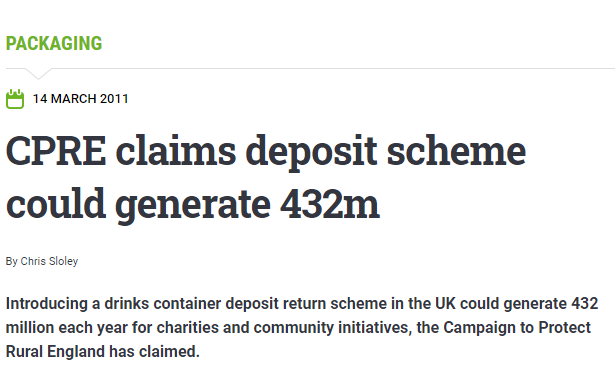
But less than a year after the prime minister’s pledge to consider a DRS, we're forced to criticise the government’s review of waste policy for missing an opportunity to introduce a new system.
Samantha Harding, then manager of CPRE’s Stop the Drop campaign, says: ‘The government say they aspire to a zero waste economy yet they appear to be content to allow UK recycling rates to flatline at 40%. Most importantly for us, they do nothing to support an initiative that significantly reduces litter and could deliver a 90% recycling rate for drinks containers. The review acknowledges that deposit schemes increase recycling and reduce litter, but it doesn’t have the bottle to support them.’
Not only do the specifics of a DRS make economic sense but CPRE’s next report, From Waste to Work, shows that the introduction of a DRS in the UK could create between 3,000 and 4,300 full-time jobs. The findings are launched by waste consultants Eunomia at the TUC Climate Change Conference. Brendan Barber, then TUC general secretary, says: ‘Bottle deposit schemes were once commonplace and now it’s definitely time to bring them back.’
More jobs for less waste
Five years after Bill Bryson launched Stop the Drop, we coordinate the launch of the UK Deposit Alliance. Speakers from across Europe highlight how putting a small deposit on drinks containers increases recycling revenue and quality, creates jobs and eradicates litter. The event unveils results from a comprehensive pilot project in Catalonia, preliminary findings from eight pilot projects in Scotland, and evidence of the success of the scheme in Germany after 10 years in operation.
Samantha Harding says: ‘With millions of drinks containers made from finite resources sold every year in the UK, many of which end up as litter on land and at sea, we should do everything we can to capture them for recycling.’
By now the evidence from overseas is heaping up - and our UK neighbours begin piling on the pressure too. In spring 2015, our Scottish colleagues at the Association for the Protection of Rural Scotland publish polling showing nearly 80% of the Scottish public would support a deposit return system. In September, they launch Have You Got the Bottle? – a campaign for a Scottish DRS wholeheartedly supported by CPRE.
Scotland’s environment secretary, Richard Lochhead, calls on his Westminster counterpart Liz Truss to introduce a UK-wide DRS.



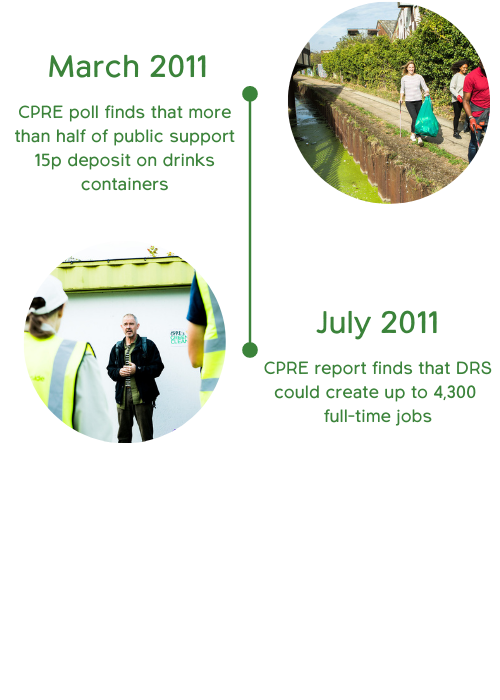
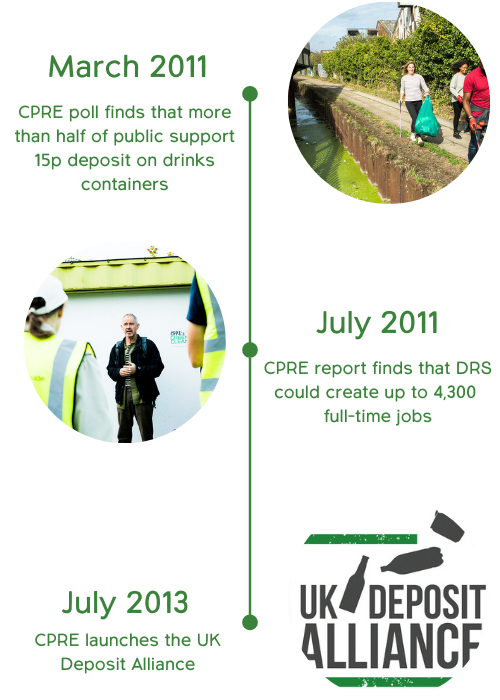
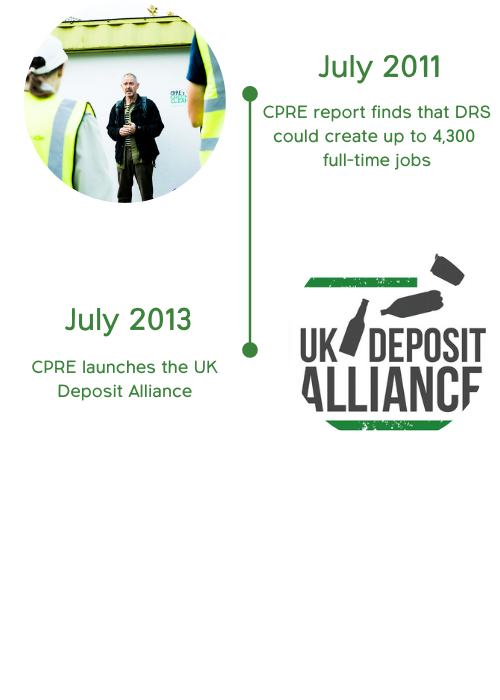
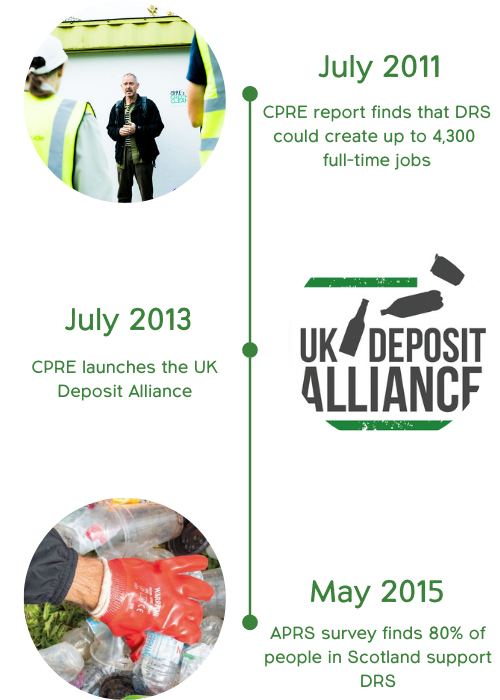
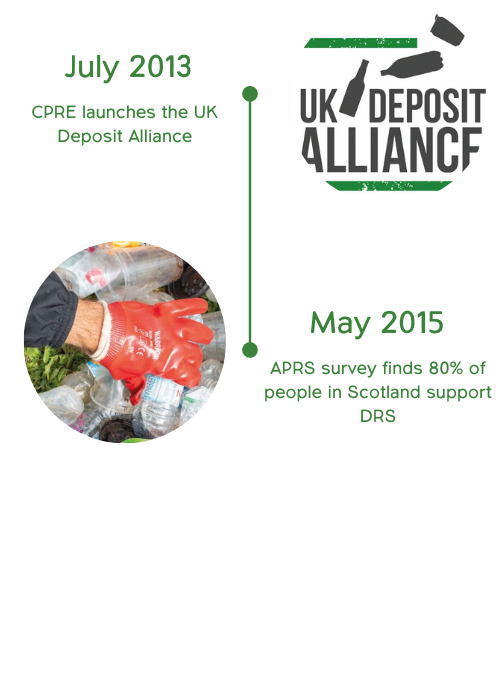
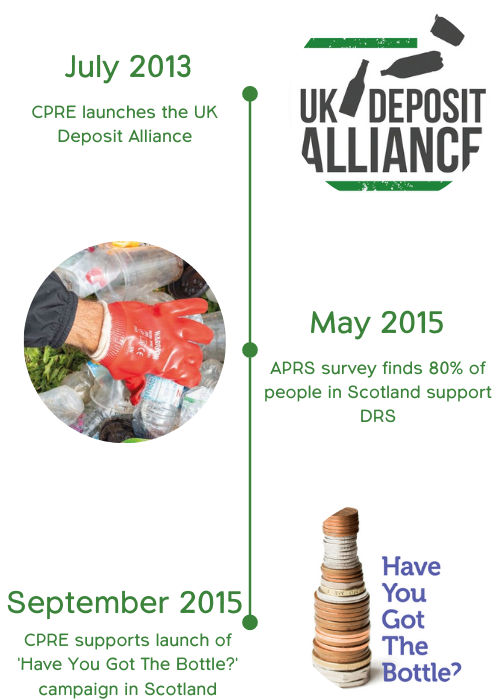
CPRE calculations show that a DRS could raise over £432 million each year for local charities and community initiatives, from donated deposits. A CPRE survey by Ipsos MORI also finds that more than half of those surveyed (53%) supported a 15p deposit on 500ml drinks containers, with only 30% opposed.

But less than a year after the prime minister’s pledge to consider a DRS, we're forced to criticise the government’s review of waste policy for missing an opportunity to introduce a new system.
Samantha Harding, then manager of CPRE’s Stop the Drop campaign, says: ‘The government say they aspire to a zero waste economy yet they appear to be content to allow UK recycling rates to flatline at 40%. Most importantly for us, they do nothing to support an initiative that significantly reduces litter and could deliver a 90% recycling rate for drinks containers. The review acknowledges that deposit schemes increase recycling and reduce litter, but it doesn’t have the bottle to support them.’
Not only do the specifics of a DRS make economic sense but CPRE’s next report, From Waste to Work, shows that the introduction of a DRS in the UK could create between 3,000 and 4,300 full-time jobs. The findings are launched by waste consultants Eunomia at the TUC Climate Change Conference. Brendan Barber, then TUC general secretary, says: ‘Bottle deposit schemes were once commonplace and now it’s definitely time to bring them back.’
More jobs for less waste
Five years after Bill Bryson launched Stop the Drop, we coordinate the launch of the UK Deposit Alliance. Speakers from across Europe highlight how putting a small deposit on drinks containers increases recycling revenue and quality, creates jobs and eradicates litter. The event unveils results from a comprehensive pilot project in Catalonia, preliminary findings from eight pilot projects in Scotland, and evidence of the success of the scheme in Germany after 10 years in operation.
Samantha Harding says: ‘With millions of drinks containers made from finite resources sold every year in the UK, many of which end up as litter on land and at sea, we should do everything we can to capture them for recycling.’
By now the evidence from overseas is heaping up - and our UK neighbours begin piling on the pressure too. In spring 2015, our Scottish colleagues at the Association for the Protection of Rural Scotland publish polling showing nearly 80% of the Scottish public would support a deposit return system. In September, they launch Have You Got the Bottle? – a campaign for a Scottish DRS wholeheartedly supported by CPRE.
Scotland’s environment secretary, Richard Lochhead, calls on his Westminster counterpart Liz Truss to introduce a UK-wide DRS.
It's in the bag
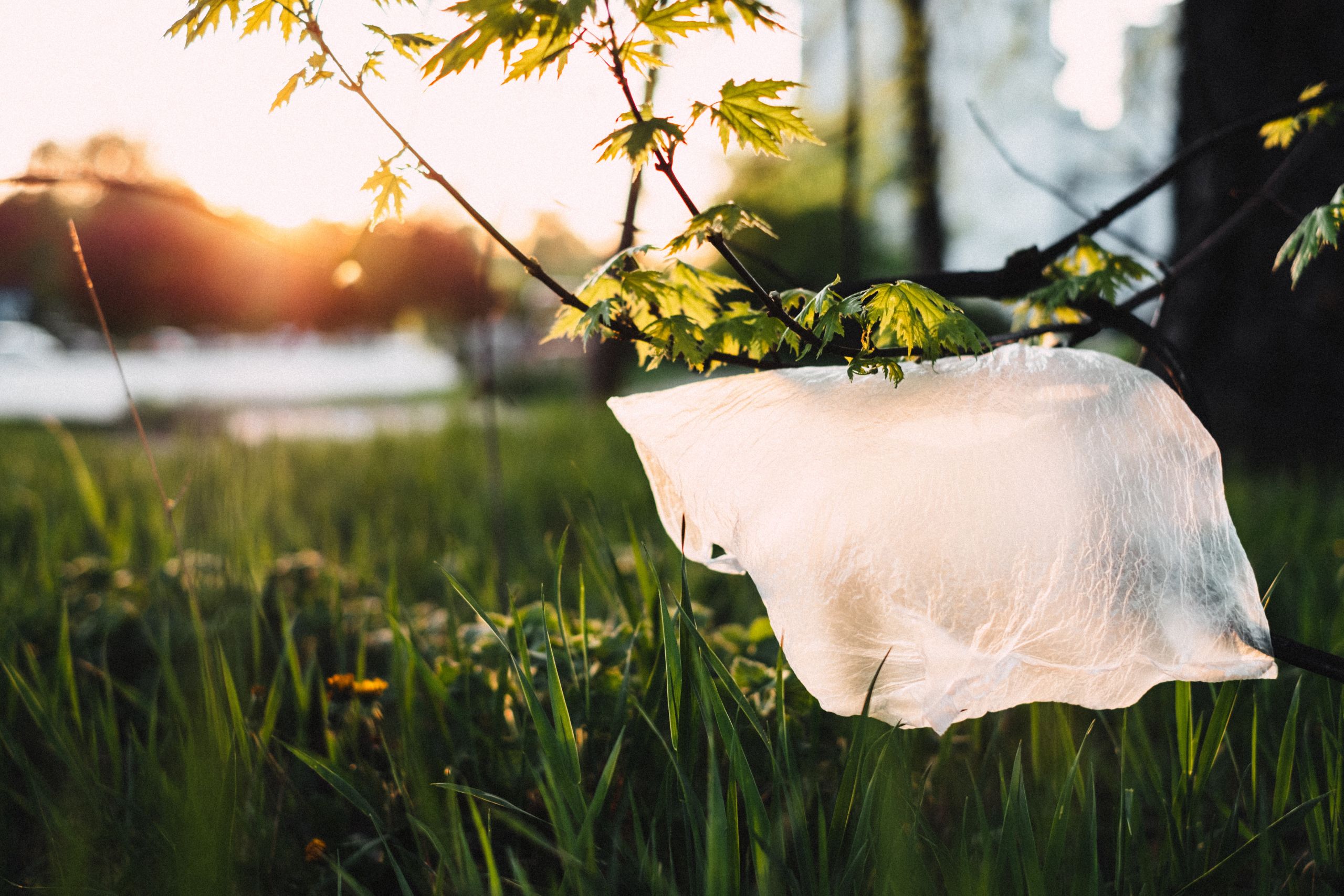
A huge success in the campaign to charge for plastic bags to reduce waste and litter heartens everyone involved in cutting waste. A 5p charge on plastic bags is introduced in 2015 after a three-year campaign led by CPRE, as part of the Break the Bag Habit coalition. As well as reducing the number of plastic bags handed out by over 7 billion in its first six months (leading to a long-term reduction of 80%), the popularity of the change helps add weight to other financial incentives to reduce waste, with public support for the DRS charge rising to 70% by May 2016.
New figures show plastic bag use is down and support for the bag charge is up: https://t.co/Sgry3z0owG pic.twitter.com/h6gSMO3l7g
— CPRE The countryside charity (@CPRE) July 30, 2016
At the end of the year, another UK neighbour picks up the baton with the Welsh Assembly debating the possibility of introducing a deposit return scheme in Wales.
Catching a wave
By spring of 2016, it's clear that the financial incentives of a bag change are working - and there's a growing awareness of the problem of plastics both on land and in the sea. The Marine Conservation Society calls for the introduction of a DRS after a record amount of litter is found on UK beaches in 2015. Worryingly, the number of plastic bottles on beaches has increased by over 43% since 2014.
Our new president from June 2016, Emma Bridgewater, uses a Mail on Sunday interview to call for a deposit return system, revealing ‘a pet hate of mine – the discarded plastic bottles, whether in hedgerows or bobbing in ponds and lakes’.
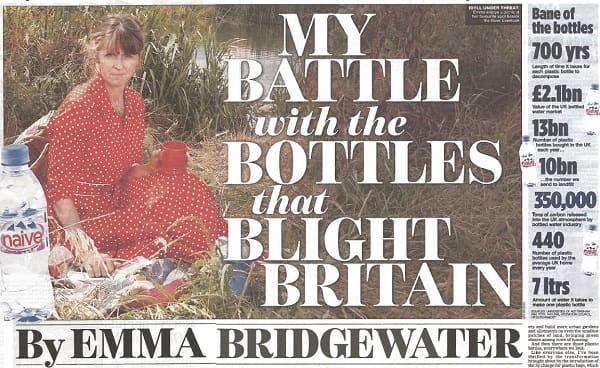
‘Ten billion plastic bottles are thrown away every year, littering streets and polluting pristine landscapes alike. I want to see this tide of plastic driven back.’
By the autumn, Emma is appearing on BBC Breakfast to make the case for a DRS and is filmed visiting a bottle recycling plant.
Helpful evidence again comes from the plastic bags case when Cardiff University shows that 90% of shoppers were taking their own bags shopping, suggesting genuine behavioural change and the potential of a financial incentive on drinks containers.
Cardiff professor Wouter Poortinga says that the research ‘suggests that other similar policies could be successfully implemented, such as a deposit return scheme on plastic bottles’.
With the government having gone quiet on DRS, then Green Party co-leader Caroline Lucas MP tables an Early Day Motion calling for the introduction of a DRS.


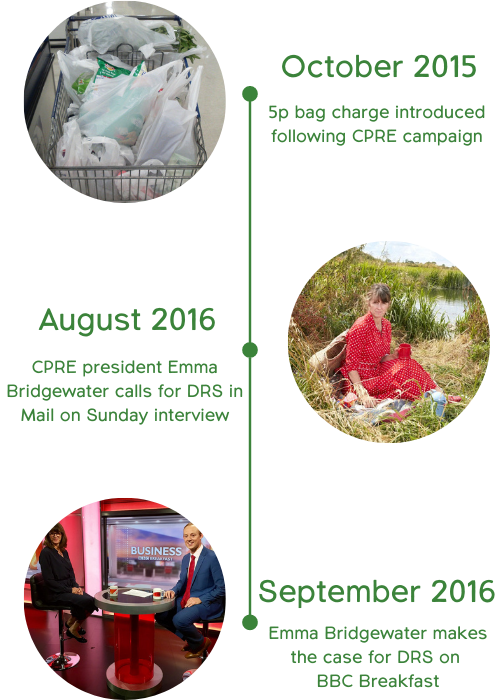
A huge success in the campaign to charge for plastic bags to reduce waste and litter heartens everyone involved in cutting waste. A 5p charge on plastic bags is introduced in 2015 after a three-year campaign led by CPRE, as part of the Break the Bag Habit coalition. As well as reducing the number of plastic bags handed out by over 7 billion in its first six months (leading to a long-term reduction of 80%), the popularity of the change helps add weight to other financial incentives to reduce waste, with public support for the DRS charge rising to 70% by May 2016.
New figures show plastic bag use is down and support for the bag charge is up: https://t.co/Sgry3z0owG pic.twitter.com/h6gSMO3l7g
— CPRE The countryside charity (@CPRE) July 30, 2016
At the end of the year, another UK neighbour picks up the baton with the Welsh Assembly debating the possibility of introducing a deposit return scheme in Wales.
Catching a wave
By spring of 2016, it's clear that the financial incentives of a bag change are working - and there's a growing awareness of the problem of plastics both on land and in the sea. The Marine Conservation Society calls for the introduction of a DRS after a record amount of litter is found on UK beaches in 2015. Worryingly, the number of plastic bottles on beaches has increased by over 43% since 2014.
Our new president from June 2016, Emma Bridgewater, uses a Mail on Sunday interview to call for a deposit return system, revealing ‘a pet hate of mine – the discarded plastic bottles, whether in hedgerows or bobbing in ponds and lakes’.

‘Ten billion plastic bottles are thrown away every year, littering streets and polluting pristine landscapes alike. I want to see this tide of plastic driven back.’
By the autumn, Emma is appearing on BBC Breakfast to make the case for a DRS and is filmed visiting a bottle recycling plant.
Helpful evidence again comes from the plastic bags case when Cardiff University shows that 90% of shoppers were taking their own bags shopping, suggesting genuine behavioural change and the potential of a financial incentive on drinks containers.
Cardiff professor Wouter Poortinga says that the research ‘suggests that other similar policies could be successfully implemented, such as a deposit return scheme on plastic bottles’.
With the government having gone quiet on DRS, then Green Party co-leader Caroline Lucas MP tables an Early Day Motion calling for the introduction of a DRS.
New year, new friends
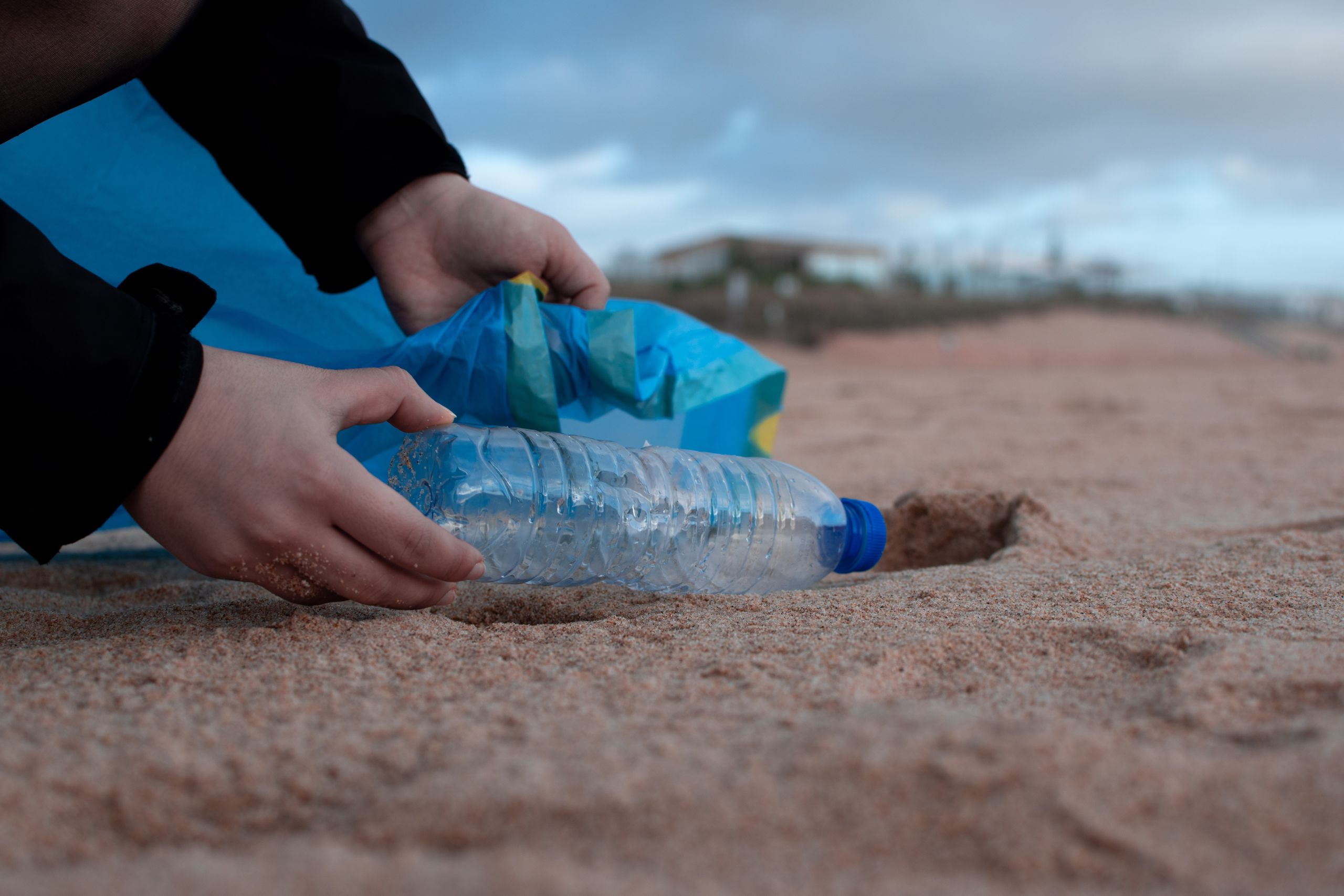





The problem of plastics in the environment goes big early in 2017 as Sky News launches its #OceanRescue campaign against single-use plastics. Richard Branson uses the platform to argue that a deposit return scheme is ‘a fantastic idea, and one that should be encouraged.’
Within a month, waste giant Suez UK comes out in favour of deposit return schemes, while Coca-Cola announces a change in its global position by deciding to support a DRS in Scotland. In April, supported by CPRE, the UK government launches a National Litter Strategy including, at last, a pledge to investigate deposit return schemes. As a leading member of Defra’s Litter Strategy Advisory Group, we also propose the creation of a Voluntary and Economic Incentives Working Group, going on to provide the secretariat for that group from October 2017 until February 2018.
Scotland makes a move
In autumn 2017, a DRS moves tantalisingly closer as we welcome the Scottish government’s announcement that it will introduce a deposit return scheme. CPRE's then litter director Samantha Harding comments:
‘This is a momentous step towards a cleaner environment, whether countryside, beach or high street. Deposit return schemes are easy to use and recapture valuable materials. There is little doubt the system will prove a triumph in Scotland, and it paves the way for the rest of the UK’.
Keeping the pressure up, CPRE joins with several organisations to publish research showing that a DRS could save local authorities across England a combined total of £35m a year. At the Conservative Party conference, then environment secretary Michael Gove says: ‘We are looking to go further to reduce plastic waste by working with industry to see how we could introduce a deposit return scheme for plastic bottles.’
Great to hear Environment Secretary @michaelgove calling for a bottle deposit return scheme: https://t.co/MsnxE9UXXm pic.twitter.com/cOKj6aOFFU
— CPRE The countryside charity (@CPRE) July 21, 2017
November sees retailers Iceland and the Co-op come on board, declaring their support for a UK deposit return system.
We finish the year on a high: after receiving evidence from CPRE and others, the Environmental Audit Committee recommends that the UK government should introduce a deposit return scheme for plastic bottles to help increase recycling and curb the devastation caused by plastic waste.
The problem of plastics in the environment goes big early in 2017 as Sky News launches its #OceanRescue campaign against single-use plastics. Richard Branson uses the platform to argue that a deposit return scheme is ‘a fantastic idea, and one that should be encouraged.’
Within a month, waste giant Suez UK comes out in favour of deposit return schemes, while Coca-Cola announces a change in its global position by deciding to support a DRS in Scotland. In April, supported by CPRE, the UK government launches a National Litter Strategy including, at last, a pledge to investigate deposit return schemes. As a leading member of Defra’s Litter Strategy Advisory Group, we also propose the creation of a Voluntary and Economic Incentives Working Group, going on to provide the secretariat for that group from October 2017 until February 2018.
Scotland makes a move
In autumn 2017, a DRS moves tantalisingly closer as we welcome the Scottish government’s announcement that it will introduce a deposit return scheme. CPRE's then litter director Samantha Harding comments: ‘This is a momentous step towards a cleaner environment, whether countryside, beach or high street. Deposit return schemes are easy to use and recapture valuable materials. There is little doubt the system will prove a triumph in Scotland, and it paves the way for the rest of the UK’.
Keeping the pressure up, CPRE joins with several organisations to publish research showing that a DRS could save local authorities across England a combined total of £35m a year. At the Conservative Party conference, then environment secretary Michael Gove says: ‘We are looking to go further to reduce plastic waste by working with industry to see how we could introduce a deposit return scheme for plastic bottles.’
Great to hear Environment Secretary @michaelgove calling for a bottle deposit return scheme: https://t.co/MsnxE9UXXm pic.twitter.com/cOKj6aOFFU
— CPRE The countryside charity (@CPRE) July 21, 2017
November sees retailers Iceland and the Co-op come on board, declaring their support for a UK deposit return system.
We finish the year on a high: after receiving evidence from CPRE and others, the Environmental Audit Committee recommends that the UK government should introduce a deposit return scheme for plastic bottles to help increase recycling and curb the devastation caused by plastic waste.
Media blitz
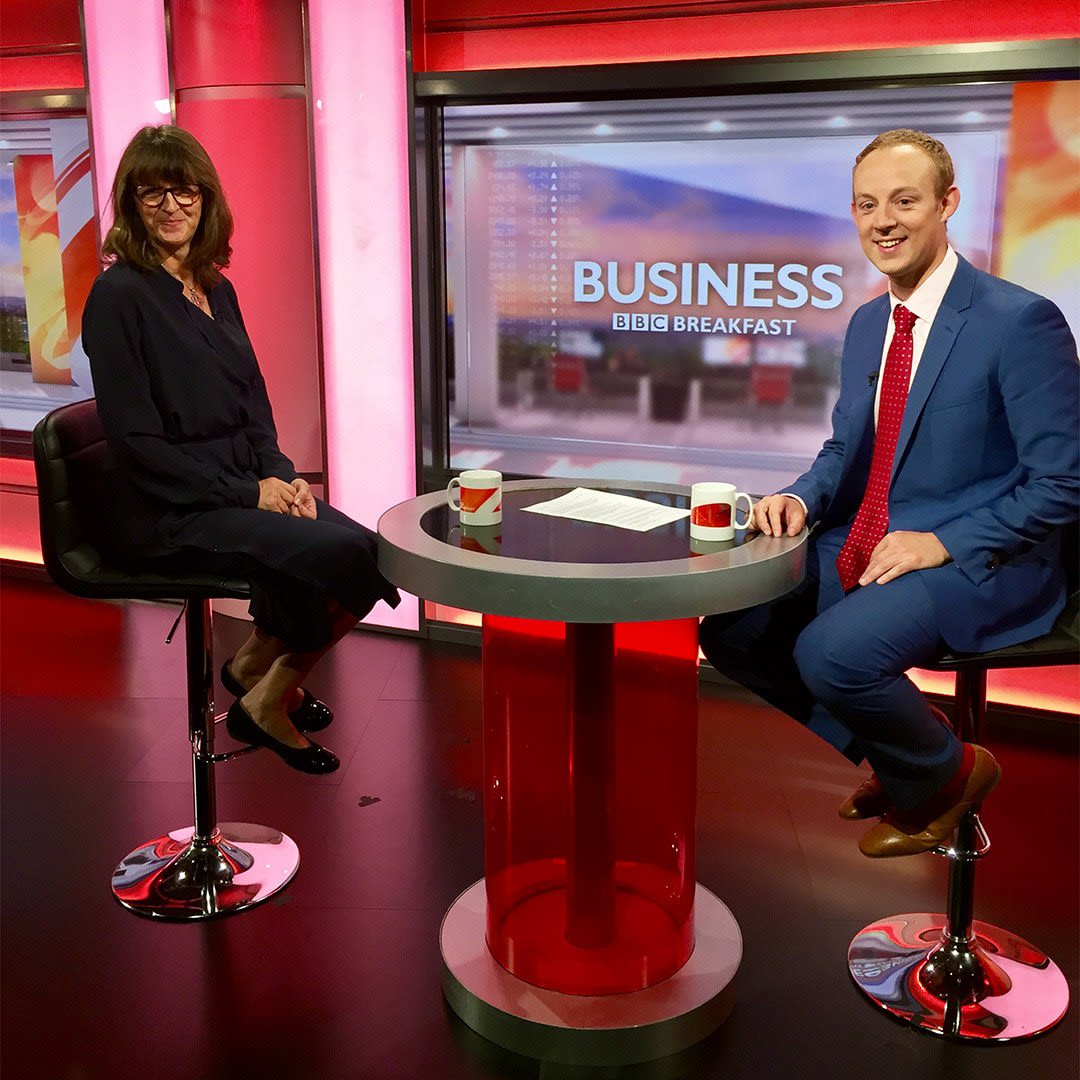
The media are beginning to sense there might be a change coming. The Times kicks off 2018 with a report that the Voluntary and Economic Incentives Working Group will tell ministers that ‘a deposit return scheme (DRS) would result in far higher recovery of used bottles and cans as well as reducing litter and improving the quality of material sent for recycling.’
The next month, writing that the UK could adopt Norway’s DRS, the BBC’s environment analyst Roger Harrabin notes that CPRE’s Samantha Harding has been campaigning on the issue for more than a decade. He reports that Samantha pointed out that ‘the great advantage of deposit return schemes is that it obliges each part of the plastic chain to change their behaviour - from product concept to design; to manufacture; transport; use; and finally disposal’.
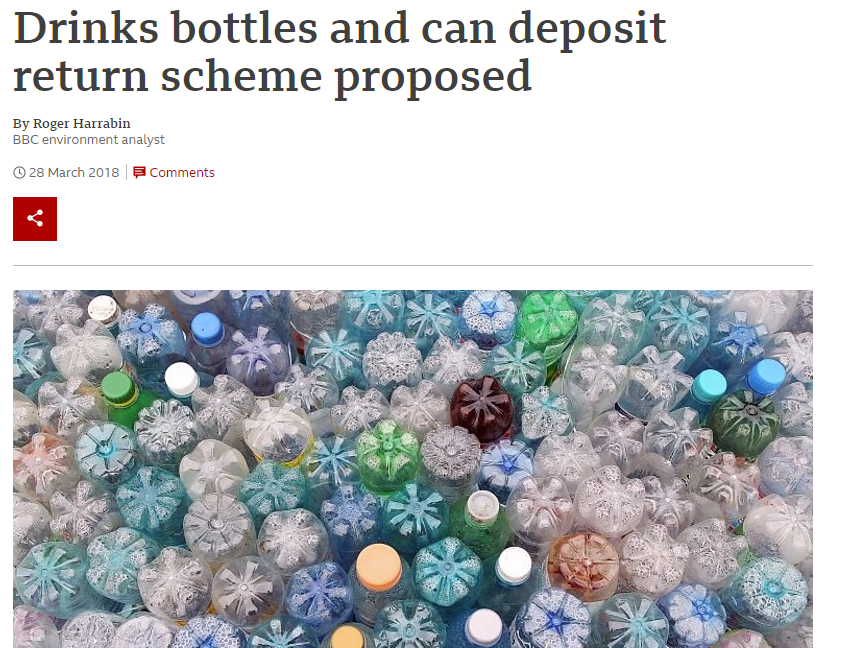
Samantha then appears on the BBC’s Victoria Derbyshire programme, saying that ‘we can only hope that the UK Government and Welsh Assembly will follow the Scottish Government in going ahead with a full system for every can and bottle’.
Later in February, Samantha is quoted in The Times in response to attempts by the packaging industry to avoid a DRS by increasing their contributions to recycling costs:
‘The industry is trying to fool Mr Gove into not supporting a deposit scheme by offering a relatively small amount of money that will have nothing like as much impact on recycling and litter. The industry knows deposits are the thin end of the wedge in terms of making them responsible for the full cost of collecting and recycling the packaging they produce. At present 90% of these costs fall to the taxpayer’.
In March, CPRE President Emma Bridgewater co-signs a letter to The Times with her predecessors Andrew Motion, Max Hastings, Jonathan Dimbleby and David Puttnam, urging Michael Gove to announce a mandatory deposit return scheme for all bottles and cans or risk allowing the UK to ‘become “the dirty man of Europe” once more'.
And later that month we finally get the news we are hoping for: that England will have a DRS. It's a massive step forward and a huge win after a decade of campaigning. Bill Bryson greets the news: ‘I wholeheartedly congratulate Michael Gove for his wisdom in finally accepting the case for a deposit return scheme in the UK – I never thought I would see this in my lifetime.
'Future generations will look back on this decision as a piece of supremely enlightened policymaking, and one that raises the prospect of the world’s most beautiful country becoming free from drinks container litter at last. My most profound gratitude goes to the tireless campaigners and heroic litter pickers of CPRE who, for the past decade, have kept the issue alive in the minds of our politicians, press and public.’



The media are beginning to sense there might be a change coming. The Times kicks off 2018 with a report that the Voluntary and Economic Incentives Working Group will tell ministers that ‘a deposit return scheme (DRS) would result in far higher recovery of used bottles and cans as well as reducing litter and improving the quality of material sent for recycling.’
The next month, writing that the UK could adopt Norway’s DRS, the BBC’s environment analyst Roger Harrabin notes that CPRE’s Samantha Harding has been campaigning on the issue for more than a decade. He reports that Samantha pointed out that ‘the great advantage of deposit return schemes is that it obliges each part of the plastic chain to change their behaviour - from product concept to design; to manufacture; transport; use; and finally disposal’.

Samantha then appears on the BBC’s Victoria Derbyshire programme, saying that ‘we can only hope that the UK Government and Welsh Assembly will follow the Scottish Government in going ahead with a full system for every can and bottle’.
Later in February, Samantha is quoted in The Times in response to attempts by the packaging industry to avoid a DRS by increasing their contributions to recycling costs:
‘The industry is trying to fool Mr Gove into not supporting a deposit scheme by offering a relatively small amount of money that will have nothing like as much impact on recycling and litter. The industry knows deposits are the thin end of the wedge in terms of making them responsible for the full cost of collecting and recycling the packaging they produce. At present 90% of these costs fall to the taxpayer’.
In March CPRE President Emma Bridgewater co-signs a letter to The Times with her predecessors Andrew Motion, Max Hastings, Jonathan Dimbleby and David Puttnam, urging Michael Gove to announce a mandatory deposit return scheme for all bottles and cans or risk allowing the UK to ‘become “the dirty man of Europe” once more’.
And later that month we finally get the news we are hoping for: that England will have a DRS. It's a massive step forward and a huge win after a decade of campaigning. Bill Bryson greets the news: ‘I wholeheartedly congratulate Michael Gove for his wisdom in finally accepting the case for a deposit return scheme in the UK – I never thought I would see this in my lifetime.
'Future generations will look back on this decision as a piece of supremely enlightened policymaking, and one that raises the prospect of the world’s most beautiful country becoming free from drinks container litter at last. My most profound gratitude goes to the tireless campaigners and heroic litter pickers of CPRE who, for the past decade, have kept the issue alive in the minds of our politicians, press and public.’
Keeping on keeping on
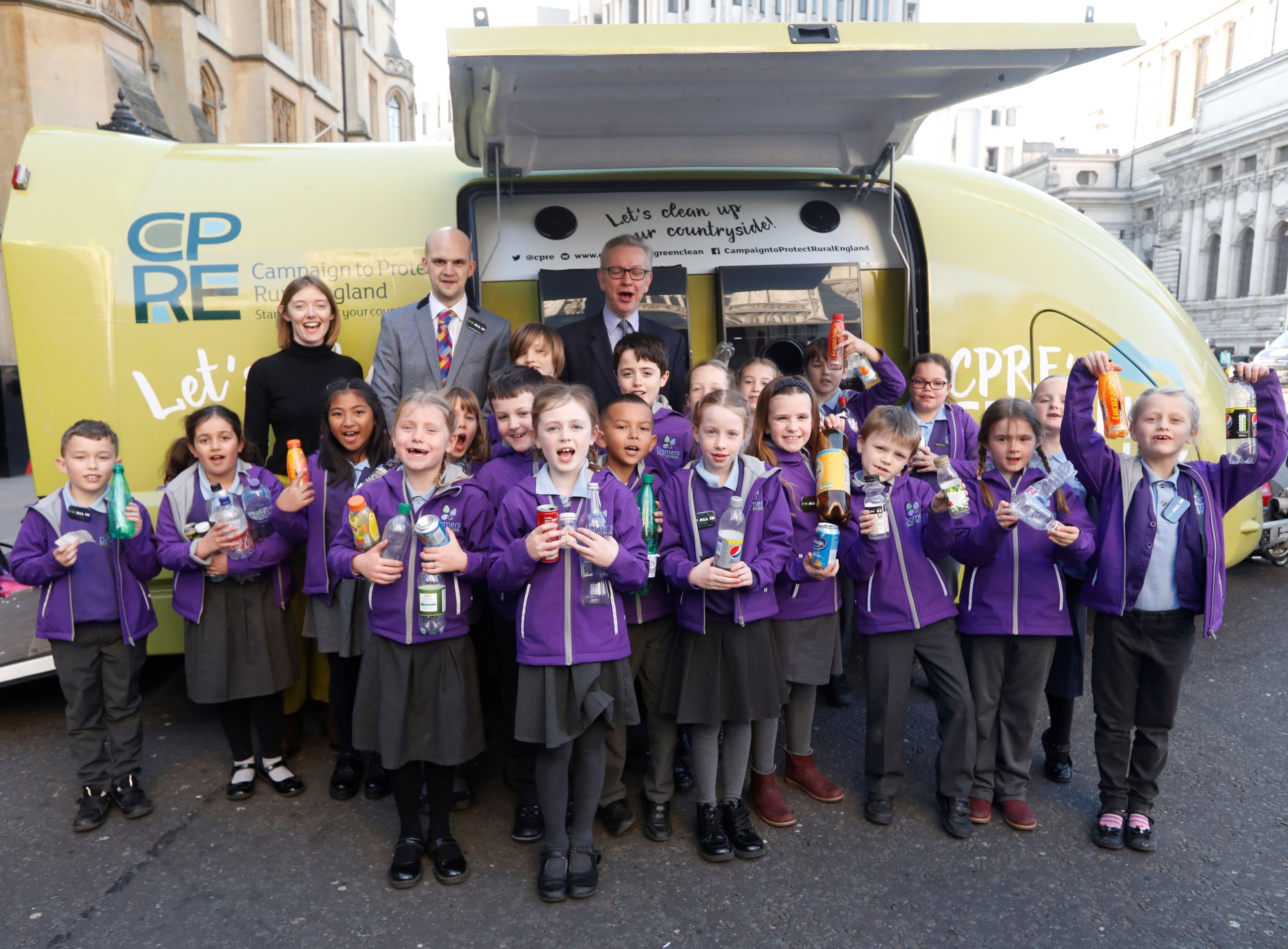
May 2018 sees CPRE join an international call for a DRS by taking part in the global Clean Planet day of action.
But we know that now the government will want to consult on different types of DRS. Concerned that the industry wanted a more limited system – that was less likely to have as much impact on levels of litter and so more vulnerable to being abandoned - in 2019, we asked people again what they wanted. Again, it shows resounding support for a DRS.
The publication of the 2019 Environment Bill creates powers to put a DRS in place, and so we use our big Green Clean litter pick to show how desperately it's still needed. 10,000 drinks containers are collected during the month-long litter pick, including cans, plastic bottles of all sizes and glass bottles.
We even get environment minister Michael Gove to come and meet a class of eco-conscious pupils from Damers First School, along with our mobile deposit return machine, to hear why they want a DRS.
We’re not quite there yet. Despite all the promises, 2021 has seen the government run another consultation on the type of DRS that should be put in place.
This is something that we're really clear: it should be all in – every material and every size. We and thousands more have let the government know our views - and we wait for change.
Find out more about how you can get involved
Our DRS campaign was built with the help of our supporters who gave their time, voice and donated to support the campaign. See how you can get involved with CPRE, the countryside charity.

